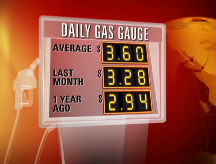Fed could burst oil's bubble
Central bank rate cuts have devalued the dollar, fueling the rise in crude prices; but if rate slashing stops, oil's rise may ease.
NEW YORK (CNNMoney.com) -- Crude oil prices and the value of the dollar have been marching in different directions for months. But that may shift if the Federal Reserve signals on Wednesday that its rate-cutting campaign has come to a close.
One factor that has sent the dollar down and oil up recently has been the Federal Reserve's months-long round of rate cuts. In an attempt to stimulate the ailing U.S. economy, the central bank has cut rates by three percentage points since September. But the rate cuts are also inflationary, weakening the dollar and sending oil prices higher.
"The weak dollar is a major detriment to the price of oil," said Stephen Schork, publisher of the energy industry newsletter The Schork Report. "It's keeping prices artificially high."
Since this time last year, the dollar has plummeted over 10% against global currencies, and oil has climbed about 80%. As the dollar continues to depreciate in value, investors have bought oil futures as a hedge against inflation.
Also, oil is priced in dollars worldwide, so a falling dollar provides less incentive for oil-exporting countries to increase output, or for foreign consumers to cut back on oil use.
As a result, oil traders will be closely watching the Fed on Wednesday. Though most economists have forecast a quarter of a percentage point cut to its key funds rate, many economists are also predicting the Fed will hint that it will keep rates steady, or even raise rates in future meetings, to protect against inflation.
"All of us are hoping for a 25-point cut with a statement that that's it," said MF Global energy analyst John Kilduff. "Some of us wouldn't mind if there's no cut."
Whispers that the current round of rate cuts is coming to an end may send crude prices lower.
"There is a very strong correlation between the dollar and crude, so it all depends on how dollar reacts to the news," said Schork. "If the dollar appreciates, then that will give crude leeway to move downward and drive a stick into this bubble"
Even the head of the Organization of Petroleum Exporting Countries (OPEC) has said that the weak dollar is a big reason behind record oil prices.
According to a report in Algerian government newspaper El Moudjahid on Monday, OPEC president Chakib Khelil said that crude prices probably would fall if not for dollar weakness. In fact, Khelil said if the dollar begins to gain back some significant ground, crude prices may fall of a cliff.
"If [the dollar] strengthens 10%, there is a good bet that [oil] prices will fall by $ 40," said Khelil.
But until that happens, don't count on OPEC to increase production again. In September, OPEC acknowledged that there was not enough crude to supply growing demand, and they allowed countries to produce more oil.
U.S. crude supplies have steadily increased since then, even as demand has fallen in the face of slowing consumer spending.
But oil prices have still jumped 58% since September, leading analysts to suggest that OPEC shouldn't increase production further since it probably won't work.
"The market went haywire regardless, so OPEC just decided they'd stick to their guns - and deservedly so," said Schork. "From their perspective, there's enough crude on the market, case closed." ![]()



